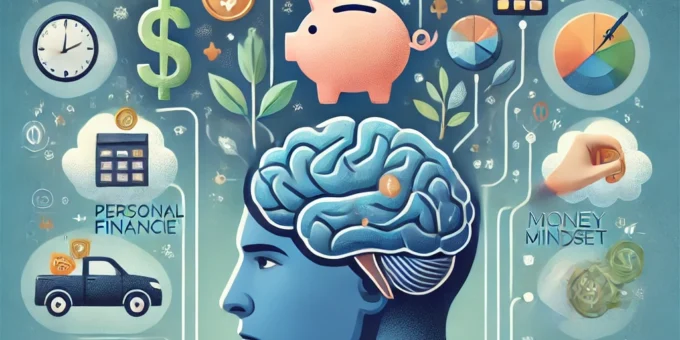
Money isn’t just about numbers—it’s deeply tied to our emotions, habits, and subconscious beliefs. The psychology of personal finance explains why we make certain financial decisions, even when they seem irrational. By understanding the way our minds shape financial behavior, we can break bad habits, develop a healthier relationship with money, and achieve long-term financial stability.
How Emotions Influence Financial Decisions
Emotions play a critical role in how we handle money. Fear, stress, excitement, and even guilt can drive our spending and saving habits.
Impulse Spending and Emotional Triggers
Many people spend money as a way to cope with stress or celebrate achievements. Whether it’s retail therapy after a tough day or splurging on luxury items when feeling successful, emotions often override rational decision-making.
How to Control It:
- Recognize emotional spending patterns.
- Implement a 24-hour rule before making non-essential purchases.
- Use cash or debit cards instead of credit to limit impulsive spending.
Fear of Missing Out (FOMO) and Overspending
Social media and peer pressure can create a sense of urgency to keep up with others’ lifestyles, leading to excessive spending. Seeing influencers travel the world or buy expensive cars can trigger irrational financial decisions.
How to Overcome It:
- Focus on personal financial goals instead of comparison.
- Set spending limits for luxury purchases.
- Remind yourself that social media showcases highlights, not reality.
The Role of Money Mindset in Financial Success
Our financial behaviors stem from deep-rooted beliefs about money, often formed during childhood. Understanding your money mindset can help you reframe negative financial habits.
Scarcity vs. Abundance Mindset
- Scarcity Mindset: People with this belief think money is always limited. They avoid risks and hesitate to invest, fearing loss.
- Abundance Mindset: These individuals see money as a tool for growth. They are more likely to take calculated risks, invest, and seek financial education.
How to Shift to an Abundance Mindset:
- Replace negative financial beliefs with positive affirmations.
- Educate yourself on wealth-building strategies.
- Surround yourself with financially responsible people.
Behavioral Biases That Impact Money Management
Cognitive biases affect the way we save, invest, and spend money. Recognizing these biases can help us make smarter financial decisions.
Present Bias and Procrastination
People tend to prioritize short-term rewards over long-term benefits, leading to poor financial habits like not saving for retirement or delaying debt repayment.
Solution:
- Automate savings and investments to remove the temptation to spend.
- Set clear financial goals with deadlines.
Loss Aversion and Investment Hesitation
People fear losing money more than they value gains, leading them to avoid investing or pull out of the stock market too soon.
Solution:
- Understand that risk is necessary for financial growth.
- Diversify investments to minimize potential losses.
How Financial Stress Affects Decision-Making
Financial stress can lead to anxiety, poor decision-making, and even physical health issues. When people feel overwhelmed by money problems, they may either ignore them or make hasty, irrational choices.
Strategies to Reduce Financial Stress
- Create a financial plan to gain control over money management.
- Prioritize emergency savings to prepare for unexpected expenses.
- Seek professional advice if struggling with debt or money management.
Building Healthy Financial Habits Through Psychology
By aligning psychology with smart financial practices, we can develop long-term habits that lead to financial freedom.
Use Behavioral Triggers for Positive Financial Actions
- Set up automatic savings transfers.
- Use separate bank accounts for spending and saving.
- Reward yourself for reaching financial milestones.
Practice Mindful Spending
- Ask yourself, “Does this purchase align with my financial goals?”
- Track expenses and adjust spending habits accordingly.
- Differentiate between needs and wants before making purchases.
FAQs
How does psychology impact financial decision-making?
Psychological factors like emotions, habits, and biases influence how people spend, save, and invest their money.
Why do people struggle with saving money?
Many individuals struggle with saving due to present bias, impulsive spending, or a scarcity mindset that creates fear around money management.
How can I stop emotional spending?
Recognizing spending triggers, setting spending limits, and delaying purchases can help control emotional spending habits.
What is the best way to shift to a healthier money mindset?
Educate yourself on financial strategies, set clear goals, and adopt an abundance mindset to encourage better financial habits.
Why do people fear investing?
Loss aversion and a lack of financial knowledge often make people hesitant to invest. Understanding investment risks and diversification can help overcome this fear.
How can I reduce financial stress?
Creating a budget, building emergency savings, and seeking financial education or professional advice can significantly reduce financial stress.
Understanding the psychology of personal finance is essential for making smarter financial choices. By recognizing how emotions, biases, and habits influence money management, you can take control of your financial future and build lasting wealth.
